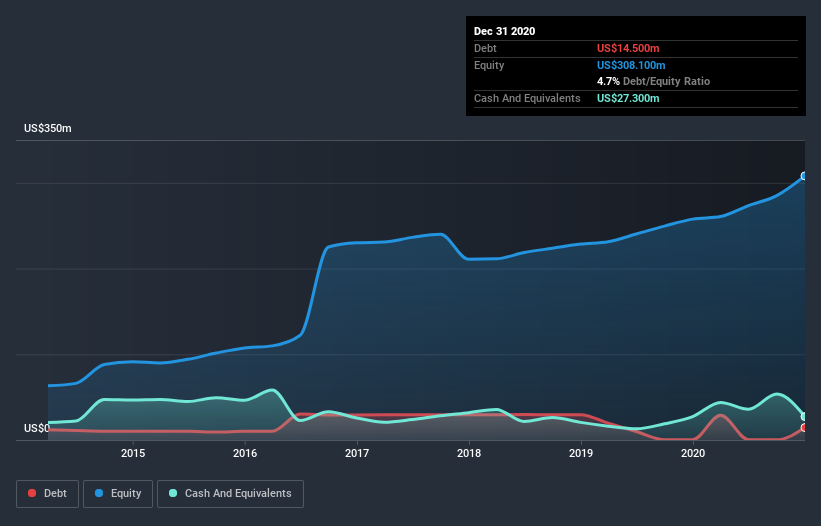Does IES Holdings (NASDAQ:IESC) Have A Healthy Balance Sheet?
Howard Marks put it nicely when he said that, rather than worrying about share price volatility, 'The possibility of permanent loss is the risk I worry about... and every practical investor I know worries about.' When we think about how risky a company is, we always like to look at its use of debt, since debt overload can lead to ruin. We can see that IES Holdings, Inc. (NASDAQ:IESC) does use debt in its business. But is this debt a concern to shareholders?
When Is Debt A Problem?
Debt and other liabilities become risky for a business when it cannot easily fulfill those obligations, either with free cash flow or by raising capital at an attractive price. Part and parcel of capitalism is the process of 'creative destruction' where failed businesses are mercilessly liquidated by their bankers. While that is not too common, we often do see indebted companies permanently diluting shareholders because lenders force them to raise capital at a distressed price. Of course, plenty of companies use debt to fund growth, without any negative consequences. When we think about a company's use of debt, we first look at cash and debt together.
Check out our latest analysis for IES Holdings
What Is IES Holdings's Debt?
You can click the graphic below for the historical numbers, but it shows that as of December 2020 IES Holdings had US$3.03m of debt, an increase on US$319.0k, over one year. However, its balance sheet shows it holds US$27.3m in cash, so it actually has US$24.3m net cash.
How Strong Is IES Holdings' Balance Sheet?
The latest balance sheet data shows that IES Holdings had liabilities of US$249.0m due within a year, and liabilities of US$52.3m falling due after that. Offsetting this, it had US$27.3m in cash and US$280.5m in receivables that were due within 12 months. So it actually has US$6.50m more liquid assets than total liabilities.
Having regard to IES Holdings' size, it seems that its liquid assets are well balanced with its total liabilities. So it's very unlikely that the US$929.2m company is short on cash, but still worth keeping an eye on the balance sheet. Succinctly put, IES Holdings boasts net cash, so it's fair to say it does not have a heavy debt load!
On top of that, IES Holdings grew its EBIT by 36% over the last twelve months, and that growth will make it easier to handle its debt. There's no doubt that we learn most about debt from the balance sheet. But it is IES Holdings's earnings that will influence how the balance sheet holds up in the future. So if you're keen to discover more about its earnings, it might be worth checking out this graph of its long term earnings trend.
Finally, a business needs free cash flow to pay off debt; accounting profits just don't cut it. IES Holdings may have net cash on the balance sheet, but it is still interesting to look at how well the business converts its earnings before interest and tax (EBIT) to free cash flow, because that will influence both its need for, and its capacity to manage debt. Over the last three years, IES Holdings recorded free cash flow worth a fulsome 93% of its EBIT, which is stronger than we'd usually expect. That positions it well to pay down debt if desirable to do so.
Summing up
While it is always sensible to investigate a company's debt, in this case IES Holdings has US$24.3m in net cash and a decent-looking balance sheet. The cherry on top was that in converted 93% of that EBIT to free cash flow, bringing in US$81m. So we don't think IES Holdings's use of debt is risky. There's no doubt that we learn most about debt from the balance sheet. But ultimately, every company can contain risks that exist outside of the balance sheet. Be aware that IES Holdings is showing 1 warning sign in our investment analysis , you should know about...
When all is said and done, sometimes its easier to focus on companies that don't even need debt. Readers can access a list of growth stocks with zero net debt 100% free, right now.
This article by Simply Wall St is general in nature. It does not constitute a recommendation to buy or sell any stock, and does not take account of your objectives, or your financial situation. We aim to bring you long-term focused analysis driven by fundamental data. Note that our analysis may not factor in the latest price-sensitive company announcements or qualitative material. Simply Wall St has no position in any stocks mentioned.
Have feedback on this article? Concerned about the content? Get in touch with us directly. Alternatively, email editorial-team (at) simplywallst.com.

